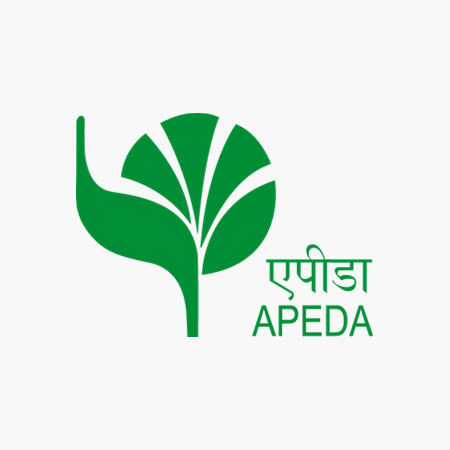Apeda Certificate
APEDA CERTIFICATE
The Agricultural and Processed Food Products Export Development Authority (APEDA) was established by the Government of India under the Agricultural and Processed Food Products Export Development Authority Act passed by the Parliament in December, 1985. The Act (2 of 1986) came into effect from 13th February, 1986 by a notification issued in the Gazette of India: Extraordinary: Part-II [Sec. 3(ii): 13.2.1986). The Authority replaced the Processed Food Export Promotion Council (PFEPC).
1.1 ASSIGNED FUNCTIONS
In accordance with the Agricultural and Processed Food Products Export Development Authority Act, 1985, (2 of 1986) the following functions have been assigned to the Authority.
- Development of industries relating to the scheduled products for export by way of providing financial assistance or otherwise for undertaking surveys and feasibility studies, participation in enquiry capital through joint ventures and other reliefs and subsidy schemes;
- Registration of persons as exporters of the scheduled products on payment of such fees as may be prescribed;
- Fixing of standards and specifications for the scheduled products for the purpose of exports;
- Carrying out inspection of meat and meat products in slaughter houses, processing plants, storage premises, conveyances or other places where such products are kept or handled for the purpose of ensuring the quality of such products;
- Improving of packaging of the Scheduled products;
- Improving of marketing of the Scheduled products outside India;
- Promotion of export oriented production and development of the Scheduled products;
- Collection of statistics from the owners of factories or establishments engaged in the production, processing, packaging, marketing or export of the scheduled products or from such other persons as may be prescribed on any matter relating to the scheduled products and publication of the statistics so collected or of any portions thereof or extracts there from;
- Training in various aspects of the industries connected with the scheduled products;
- Such other matters as may be prescribed.
1.2 PRODUCTS MONITORED
APEDA is mandated with the responsibility of export promotion and development of the following scheduled products:
- Fruits, Vegetables and their Products.
- Meat and Meat Products.
- Poultry and Poultry Products.
- Dairy Products.
- Confectionery, Biscuits and Bakery Products.
- Honey, Jaggery and Sugar Products.
- Cocoa and its products, chocolates of all kinds.
- Alcoholic and Non-Alcoholic Beverages.
- Cereal and Cereal Products.
- Groundnuts, Peanuts and Walnuts.
- Pickles, Papads and Chutneys.
- Guar Gum.
- Floriculture and Floriculture Products.
- Herbal and Medicinal Plants.
Basmati Rice has been included in the Second Schedule of APEDA Act.
In addition to this, APEDA has been entrusted with the responsibility of monitoring the import of sugar as well.
APEDA also functions as the Secretariat to the National Accreditation Board (NAB) for implementation of accreditation of the Certification Bodies under National Programme for Organic Production (NPOP) for organic exports. “Organic Products” for export are to be certified only if Produced, Processed and Packed as per the standards laid down in the document – “National Programme for Organic Production (NPOP).”
Vide DGFT Notification No. 6/2015-2020 dated: 14/06/2021 Cashew Kernels, Cashewnut Shell Liquid, Cardanol are now under the jurisdiction of APEDA.
1.3 COMPOSITION OF THE APEDA AUTHORITY
As prescribed by the statute, the APEDA Authority consists of the following members namely:
- A Chairman, appointed by the Central Government
- The Agricultural Marketing Advisor to the Government of India, ex-officio;
- One member appointed by the Central Government representing the Niti Aayog;
- Three members of Parliament of whom two are elected by the House of People and one by the Council of States
- Eight members appointed by the Central Government representing respectively; the Ministries of the Central Govt. dealing with;
- (i) Agriculture and Rural Development
- (ii) Commerce
- (iii) Finance
- (iv) Industry
- (v) Food
- (vi) Civil Supplies
- (vii) Civil Aviation
- (viii) Shipping and transport
- Five members appointed by the Central Government by rotation in the alphabetical order to represent the States and the Union Territories on the recommendations of concerned State/Union Territory;
- Seven members appointed by the Central Govt. representing
- (i) Indian Council of Agricultural Research
- (ii) National Horticultural Board
- (iii) National Agricultural Cooperative Marketing Federation
- (iv) Central Food Technological Research Institute
- (v) Indian Institute of Packaging
- (vi) Spices Export Promotion Council and
- (vii) Cashew Export Promotion Council.
- Twelve members appointed by the Central Government representing:
- (a) Fruit and Vegetable Products Industries
- (b) Meat, Poultry and Dairy Products Industries
- (c) Other Scheduled Products Industries
- (d) Packaging Industry
- Two members appointed by the Central Government from amongst specialists and scientists in the fields of agriculture, economics and marketing of the scheduled products.

